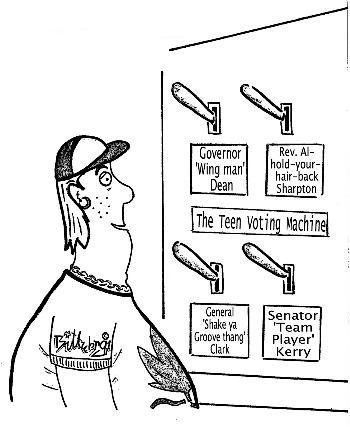
News
Cambridge Residents Slam Council Proposal to Delay Bike Lane Construction

News
‘Gender-Affirming Slay Fest’: Harvard College QSA Hosts Annual Queer Prom

News
‘Not Being Nerds’: Harvard Students Dance to Tinashe at Yardfest

News
Wrongful Death Trial Against CAMHS Employee Over 2015 Student Suicide To Begin Tuesday

News
Cornel West, Harvard Affiliates Call for University to Divest from ‘Israeli Apartheid’ at Rally
Bad Political Hangover: Youth Fail to Rock the Vote

The Boston Red Sox and young voters have one thing in common: many people do not take them seriously. Young people have one of the lowest rates of voter turnout because politicians do not take them seriously; politicians do not take them seriously because they vote in such low numbers. This endless cycle goes around and around, but unlike the curse of the Bambino, this curse can be broken. The baseball season is over, the political season has just begun, and young voters are the Wild Card of the 2004 presidential election: will this be the year they turn their reputation around?
The recent CNN/Rock the Vote debate at Faneuil Hall represented a valiant attempt to bring this cycle to an end, with eight of the nine democratic presidential candidates jockeying for attention from young voters. But while this was a good start, Generation X has a difficult task ahead. Only 17 percent of eligible voters between the ages of 18 and 29 went to the polls in 2000, making it unlikely that aspiring commanders-in-chief will actively court the youth vote.
Young people tend to blame politicians for their electoral apathy. However, moments in the CNN/Rock the Vote debate gave politicians good reason to question whether young voters truly care about the relevant issues. It is rare that young people have a chance at the microphone. Instead of using their time wisely, many audience members asked the candidates about their marijuana use and which of the candidates would do the best keg stand at a fraternity party. The CNN/Rock the Vote debate was probably of little help to viewers trying to decide among the candidates for president. However, it did make one thing clear: this generation has no hope of being treated like a powerful and influential political demographic until it starts acting like one.
Of course, I will give Generation X credit where credit is due. Some audience members asked hard-hitting questions about the economy, civil rights, the war on terror and nuclear weapons. These thoughtful questions showed that many young Americans care about the future of their country and have invested themselves in the outcome of the 2004 presidential election.
Peppered among these meaningful questions, however, were a few that undermined Rock the Vote’s effort to showcase a young generation informed about and engaged in important public policy issues. Paying homage to the 1992 Rock the Vote town hall meeting’s famous “boxers or briefs” question, a young woman simply asked, “Macs or PCs?” Most of the candidates responded with puzzled looks, and their one-word answers revealed nothing about their ability to lead this country effectively. CNN has since acknowledged that it pressured the young woman to ask this question. However, the network’s heavy handedness revealed how widespread and systemic the perception of young Americans as uninterested in politics is. CNN allegedly hosted the Rock the Vote debate in order to engage young Americans in the political process and encourage candidates to take this newest generation of potential voters seriously. Instead, it promoted an image of young Americans as superficial and irrelevant when it comes to politics.
Sadly, the audience served as their willing accomplices throughout the debate. In the final moments of the broadcast, a young woman asked the candidates which of the others they would most like to party with: “You know, who do you think can shake their groove thing? … If you get sick, who’s going to hold your hair back? ... If you see a cutie across the room, who’s going to be your wing man?” The burden rests on young voters to show the candidates for president that they are worthy of and interested in getting their attention. While the question was funny and generated priceless interactions between the candidates, it came at a great cost. As the candidates left Faneuil Hall that Tuesday, they were probably wondering whether young Americans will be able to lift their heads out of the toilet bowl long enough to make it to the polls.
Jennifer L. Kritz is a second-year student in the Masters of Public Policy program at the Kennedy School of Government. She was in attendance at the CNN/Rock the Vote debate at Boston’s Faneuil Hall.
Want to keep up with breaking news? Subscribe to our email newsletter.
